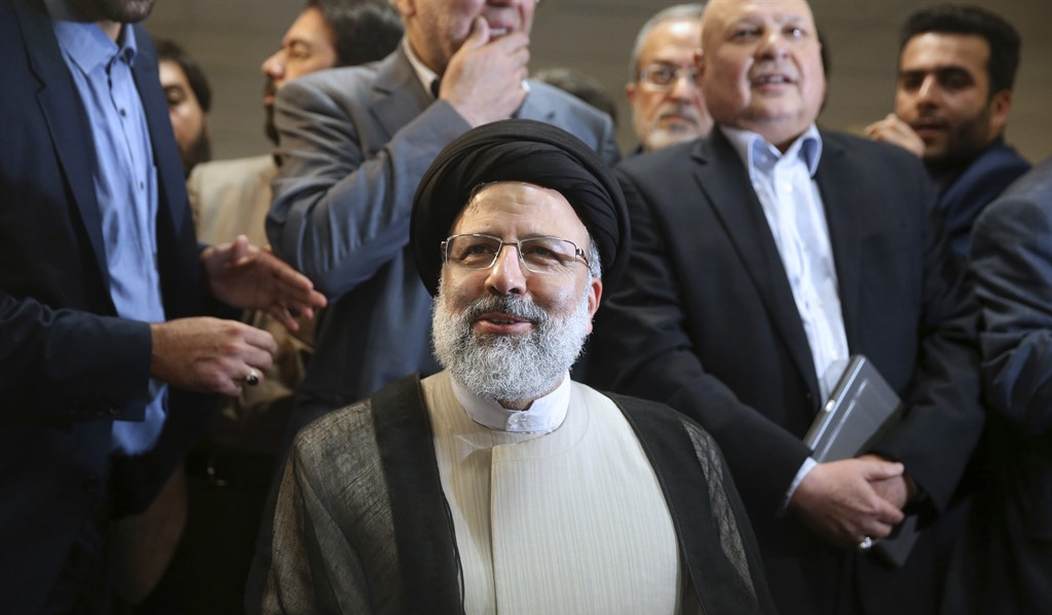The Iranian regime's upcoming presidential election has essentially become a one-man show. Truly democratic elections in Iran, by Western democratic standards, are a unicorn. But, this year, the Supreme Leader Ali Khamenei is desperate to consolidate power by ensuring his top candidate gets the presidency. To do so, he removed rival factions who had congregated under the misleading rubric of "reformists." But his Guardian Council also axed lifelong cronies like Ali Larijani, signaling Khamenei's inflexibility and vulnerability in the face of mounting crises.
Khamenei's pick, Ebrahim Raisi, is the current Judiciary Chief. He is now the only serious candidate in the sham elections. Larijani, who was disqualified despite an otherwise perfect record of serving the theocracy for decades, kowtowed to Khamenei's will and said he was "satisfied" with the decision.
Six other candidates were cleared by the Guardian Council, but none of them are considered serious contenders. Their presence on the ballot serves only to create the illusion of choice. Elections in the theocracy are obviously a sham, designed merely to distribute the spoils of war and astronomical theft among the various insider factions. When rival factions were purged from the presidential race this week, none of them mustered the courage to voice protest.
Their total subservience to the Supreme Leader reflects the typical willingness of “reformists” to fall into line and protect the theocracy overall. At every important turn, including significant social upheavals threatening the regime's survival, mafia-like factions have coalesced their interests against the Iranian people and the international community. Both are heinous human rights violators and promoters of international terrorism and nuclear proliferation.
The Guardian Council that vets the candidates is a 12-member body. Six of its members are appointed by the Supreme Leader himself, while the other six are appointed by the Judiciary Chief, who is himself appointed by Khamenei.
Recommended
When Khamenei appointed Raisi to head the judiciary in 2019, it was part of a larger plan to provide him with an unobstructed pathway to the presidency.
For much of the past four decades, American and European policymakers have tended toward a strategy that involves granting concessions to the Iranian regime in hopes that “hardliners” would lose traction and “reformists” would rise to the top of the terrorist theocracy's leadership. That was the hope in the West when Rouhani became the regime's president.
But in many ways, Tehran's foreign and domestic policies became even more aggressive and more destructive during the Rouhani era, leading to an increase in protests by the general population and ultimately to the regime killing approximately 1,500 participants in a nationwide uprising in November 2019.
That uprising was one of at least three that took place between late 2017 and early 2020, each of which featured slogans that condemned both political factions in equal measure. As the regime's most senior officials, including Khamenei, confessed later, the uprisings were led by Iran’s main opposition, the Mujahedin-e Khalq (MEK) and its rapidly growing cadre of Resistance Units inside the country.
Iranian officials and state media are warning about the growing appeal of the MEK among the public, especially the youth. That appeal has been especially visible in the run-up to the presidential election, with different groups of protesters publicly endorsing the campaign to boycott the farcical elections and “vote for regime change” instead. The regime will indeed become more vulnerable in the face of the looming nationwide uprisings.
Khamenei has abandoned the "hardliner" vs "moderate" scheme and openly selected Raisi as the next president, so as to signal that the only way forward for the regime is through expanded repression of dissent and aggression against the international community. The fact that all other factions succumbed to the decision in a pathetic and pitiful show of absolute subservience to Khamenei proves what the Iranian Resistance has been saying for decades: the notion that there are "moderates" within the regime has always been a false and misleading one.
Raisi played a leading role in the massacre of 30,000 political prisoners in the summer of 1988, mostly MEK members, in what was described as a “manifest set of crimes against humanity.” This is certain to further fuel the Iranian people’s rejection of the June 18 election as illegitimate, but it should also prompt Western powers to abandon their ill-advised strategies of appeasement and hopes of "moderation." They should hold the regime's prospective president accountable for his unambiguous crimes against humanity.
The international community should recognize what the Iranian people have said for years, and that is the illegitimacy of the regime's elections. It should take note of a House Majority in the 117th Congress when it stated that U.S. House of Representatives, “stands with the people of Iran who are continuing to hold legitimate and peaceful protests against an oppressive and corrupt regime; and recognizes the rights of the Iranian people and their struggle to establish a democratic, secular, and nonnuclear Republic of Iran.”

























Join the conversation as a VIP Member